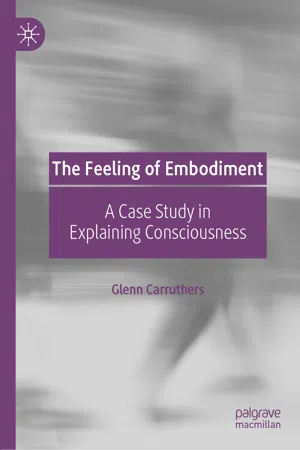Concerns such as the Hard Problem and the explanatory gap are supposed to leave us worrying about the possibility of a science of consciousness. I take it that this book (along with many others) is an existence proof sufficient to overcome that worry. None-the-less I do not think that advocates of such problems are stupid, nor wilfully blind. If underlying these concerns about the possibility of a science of consciousness are worries about how sufficient evidence can be acquired, or the adequacy of particular hypotheses in explaining all the facts about experience, then there is much common ground. As I argue in later chapters such worries have profound implications about the nature of consciousness. But they do not lead to any sort of mysterianism, nor to the conclusion that consciousness is supernatural. Why do people think that they do? What are the traditional worries about consciousness and the possibility of studying it which I am avoiding?
1.2.1 Descartes Then the “Hard Problem”
Descartes is a common place to start when raising such concerns. Not the only place by any means, and certainly one that is problematic in that it reinforces traditional power structures in philosophy. None-the-less, as my aim here is to distinguish the Real Problem of consciousness from traditional worries, I have little room to move. It is the community and not I alone that determines what tradition is, and so I will work within the community’s constraints.
Traditional worries about consciousness as a supernatural phenomenon are expressed by Descartes in the Meditations on First Philosophy.3 Although they are not the central concern of the text, which is a response to a kind of radical skepticism, they are well developed. Descartes’ concerns were expressed more as worries that the mind or self (the “I”), rather than just consciousness, must be different from the natural world. But, as he held that consciousness was not only a part of the mind, but, indeed, essential too it (at least in the meditations), the concerns obviously apply to experiences. As we will see the examples he gives of “thoughts”, which are essential to the mind or self, are all experiences.
As early as the synopsis of the Meditations
following Descartes’ letter to the Sorbonne we see that central
to Descartes’ arguments is the difference in the way the mind appears to him and how bodies (natural things) appear:
This conclusion [that mind and body are different substances – GC] is confirmed in the same Meditation by the fact that we cannot understand a body except as being divisible, while by contrast we cannot understand a mind except as being indivisible. (Descartes & Cottingham, 1996, p. 9 [13])
This purported difference between mind and body (natural thing) is based on the appearance of mind and body to Descartes. That is, on how such things seemed to him. Specifically, he compares how his mind appears to how a piece of bee’s wax appears. Bee’s wax appears to him to be divisible into smaller sections, whereas the mind appears to him as a unified whole. However, that natural things are divisible, and minds are not is not the only difference which Descartes proposes.
Descartes supposes, by way of radically skeptical thought experiments (the famous “evil demon” for example) that the existence of bodies (natural things) can be sensibly doubted (Descartes & Cottingham, 1996, pp. 15 [22–23], 18 [26–27]). In contrast, the existence of the self (the “I”) or mind cannot be doubted, for the very act of doubting proves that it must exist (Descartes & Cottingham, 1996, pp. 16–17 [24–25]).
Furthermore, bodies are defined by a set of properties. In discussing his “mental conception” of bodies (i.e. natural things),
Descartes says:
… by a body I understand whatever has a determinable shape and definable location and can occupy a space in such a way as to exclude any other body; it can be perceived by touch, sight, hearing, taste or smell, and can be moved in various ways, not by itself but by whatever else it comes into contact with. (Descartes & Cottingham, 1996, p. 17 [26])
In contrast, the self (“I”) or mind is essentially a
thinking thing (Descartes & Cottingham,
1996, p. 18 [27]). Where thoughts are understood as conscious thoughts, but also include what many today would consider as experiences distinct from thinking:
But what then am I? A thing that thinks. What is that? A thing that doubts, understands, affirms, denies, is willing, is unwilling, and also imagines and has sensory perceptions. (Descartes & Cottingham, 1996, p. 19 [28])
Playing with a piece of wax Descartes concludes that bodies (things) are different to minds. Bodies, like wax, are extended in space and are thus divisible (Descartes & Cottingham, 1996, p. 59 [85–86]) and changeable (Descartes & Cottingham, 1996, pp. 20–21 [30–31]). Later he extends this list of properties such that bodies are understood to have shape, location, motion, temporal extension, quantity, and substance (Descartes & Cottingham, 1996, p. 30 [43]). Based on how the mind appears to him, i.e. on introspection, Descartes concludes that some of these properties are shared by the conscious self, but it is not the case that the conscious self [or mind, or conscious thoughts which are essential to the self (the “I”)] is necessarily spatially extended. Thus, it is not essential that the mind has shape, position, or motion (Descartes & Cottingham, 1996, p. 30 [44]). However, as the mind is a substance, albeit of a very different kind (the famous “substance dualism” Descartes & Cottingham, 1996, p. 30 [44]), it i...
